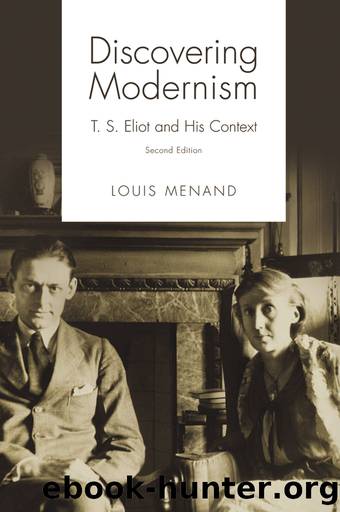Discovering Modernism by Menand Louis;

Author:Menand, Louis;
Language: eng
Format: epub
Publisher: Oxford University Press, Incorporated
Published: 1987-08-15T00:00:00+00:00
The Imagistes could be considered collectively, that is, because they were engaged on a problem that was not personalâhow the writer might best express himselfâbut institutionalâhow literature might be made more effective. The analogues West cited were the American efficiency engineers Frederick Taylor and Frank Gilbreth, whose work on âscientific managementâ43 belongs to the history of the professionalization of industry; it is a risky comparison, but its riskiness is an index of how drastic the avant-gardist, in one of her poses at least, meant the overhaul of the conventional notion of the literary vocation to be. And we might recall that it was in the same terms that, two years later, Pound put the case to Eliotâs father: there was a job of work to be done, and a respectable living to be made by doing it properly.
But the period of association-building was only a phase in the evolution of the modern profession, and the period of the literary group, as prepotent as the arrangement seemed for a time, was only a phase in the development of the modern writerâand for reasons that are parallel. The limitation of the professional association is that it is, in the end, too visible. It makes too easy a target, and the individual practitioner who borrows its credibility also takes on the problem of how to distance himself from those of its âofficialâ positions he finds inconvenient or unacceptable without losing his piece of its authority. The consummation of the professional project therefore occurs not (as Larson, for instance, suggests44) when the association has achieved independence from outside control, but when the association is no longer perceived as the true source of the professionalâs authority. Though we expect the lawyer, for instance, to have been certified by all the appropriate institutions, his social status derives from the sense of his belonging not to the Bar Association (a nineteenth-century requirement) but to the ancient profession of the law. Like any social perception, this is a sense that must be created before it can be taken for granted, and it is against the background of this final phase in the evolution of professionalism that some of the reasons for the effectiveness of T. S. Eliotâs early criticism become apparent.
By the time Eliot began making his name known as a critic, a reaction against the tendencies of literary collectivism had set in. Though they continued to find a market, the Georgian anthologies were attacked, along with their more avant-garde imitators, for the âcorporate flavourâ45 of their contents; and various alliances, notably the Imagists and the Vorticists, were beginningâwith the help, of course, of the warâto unravel. And we can find, outside literary circles, parallel indications of a general skepticism about the beneficence of the organizational spirit, signs of a renewed effort to assess the social cost of efficiency. Max Weberâs famous expressions of divided sentiments about the nature of work in the modern world, âPolitics as a Vocationâ and âScience as a Vocation,â were delivered as lectures in Germany in 1918.
Download
This site does not store any files on its server. We only index and link to content provided by other sites. Please contact the content providers to delete copyright contents if any and email us, we'll remove relevant links or contents immediately.
4 3 2 1: A Novel by Paul Auster(11078)
The handmaid's tale by Margaret Atwood(6876)
Giovanni's Room by James Baldwin(5896)
Big Magic: Creative Living Beyond Fear by Elizabeth Gilbert(4736)
Asking the Right Questions: A Guide to Critical Thinking by M. Neil Browne & Stuart M. Keeley(4601)
On Writing A Memoir of the Craft by Stephen King(4223)
Ego Is the Enemy by Ryan Holiday(4004)
Ken Follett - World without end by Ken Follett(3984)
The Body: A Guide for Occupants by Bill Bryson(3820)
Bluets by Maggie Nelson(3725)
Adulting by Kelly Williams Brown(3682)
Guilty Pleasures by Laurell K Hamilton(3602)
Eat That Frog! by Brian Tracy(3529)
White Noise - A Novel by Don DeLillo(3443)
The Poetry of Pablo Neruda by Pablo Neruda(3373)
Alive: The Story of the Andes Survivors by Piers Paul Read(3322)
The Book of Joy by Dalai Lama(3239)
The Bookshop by Penelope Fitzgerald(3238)
Fingerprints of the Gods by Graham Hancock(3224)
